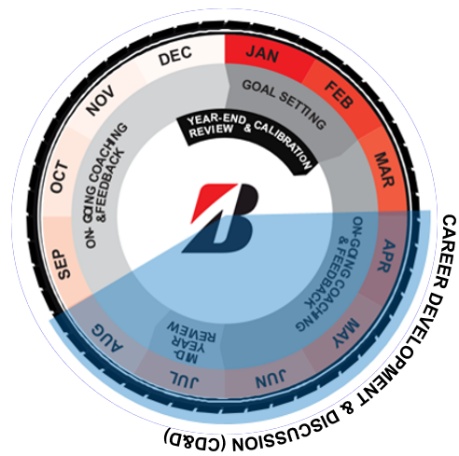Japan
The Company framed the Health Management Policy in 2020 to realize both a fulfilling life for individuals and the corporate philosophy. We are promoting various measures to maintain and improve the “mental” and “physical” health of employees, including self-care support and comfortable workplace in order to encourage and support individual health management more actively.
Also, every site in Japan has a health promotion officer or nurse, public health nurse, or other health professional who can organize a mental health team. It provides counseling services and education systems under the guidance of an industrial physician. In addition, we take active actions to ensure that the workplace improvement PDCA cycle functions effectively.
With respect to improving and enhancing employee engagement, the Company introduced an Engagement Survey in 2020 and started Pulse Surveys in 2022. The Company has been moving forward with PDCA activities by analyzing the survey results on a company-wide, departmental, and workplace basis, identifying issues and making improvement, while working together with engagement key persons assigned by each division, to create a better workplace environment where diverse talents can work with engagement.
Asia Pacific, India and China region
BSAPIC is committed to making employee health and well-being a top priority with the philosophy “Safety First, Show Care and Stay Connected”. This approach has been fully embraced by regional group companies in all 12 countries and regions where BSAPIC operates. It remains a cornerstone to drive performance while strongly promoting employee well-being and improving work-life balance.
Building on this foundation, BSAPIC introduced a regional Hybrid Work Framework in 2022, allowing each group company to localize implementation according to the dynamic needs of their respective countries and sites. This flexibility ensures relevance and resilience in a fast-changing world of work. To further support employees, Meeting Management and After Working Hours Communications guidelines were rolled out across group companies. These initiatives reinforce support for employees’ work-life balance and well-being.
Recognizing the value of the hybrid work model in enhancing employee engagement and supporting well-being, BSAPIC's group companies have committed to maintaining it. By offering employees the flexibility to work both remotely and on-site, BSAPIC reaffirms its commitment to fostering a supportive and inclusive workplace culture.
Americas region
BSAM is dedicated to fostering a culture that prioritizes well-being, addressing the diverse needs of its teams to help them flourish. By actively listening, communicating frequently, forming strategic partnerships, and continuously evolving, BSAM provides robust resources, comprehensive benefit programs, and education opportunities that support employees’ emotional, physical, and financial well-being.
In 2022, BSAM established a Well-being Task Force to gather feedback from well-being champions across the organization, aiming to further enhance the programs. The team collaborates with Bridgestone employee resource groups (ERGs) and vendors to offer webinars on various topics, including women’s health and wellness, family forming, suicide awareness for military members and veterans, and more. BSAM has expanded its Well-being space by introducing new benefit programs that support the physical, emotional, and financial well-being of its employees. Each quarter, BSAM highlights a different well-being topic, providing employees with tools and resources to improve their wellness. From proactive health engagement and stress management to crisis and legal support, retirement planning, and saving for a child’s college tuition, BSAM offers a wide array of tools, resources, and partnerships to meet employee needs.
In 2024, BSAM further expanded its initiatives in the U.S. by increasing paid parental leave and implementing a company-paid long-term disability benefit. The company introduced a plan design change to make one of the medical plans more affordable and eligible for tax friendly reimbursement account participation and enhanced its prescription drug plan. Holistic health sessions were added through a current vendor partnership. BSAM also launched a cancer care program and introduced a cardiovascular app supporting the heart health of employees. Additionally, the company focused on financial well-being, expanded ERG partnerships, collaborated with the Bridgestone WEST Well-Being Team, launched Well-Being Moments, and supported local well-being fairs. In Latin America, BSAM began implementing monthly tips communicated in Spanish and Portuguese via email to better support employees in the region.
Furthermore, BSAM launched a Well-Being Toolkit in 2024, centralizing a collection of content for well-being events. These tools are designed to help business partners and employees focus on their overall well-being, educate them about corporate benefit offerings, and promote healthy living, financial stability, and informed benefit choices.
Europe, Middle East and Africa region
BSEMEA recognizes the importance of well-being for both its employees and the organization as a whole. In 2024, BSEMEA developed or strengthened several programs aimed at enhancing productivity and boosting engagement, while supporting employees' mental and physical health through targeted initiatives and advice.
The Employee Assistance Program is a voluntary, work-based initiative offering free and confidential assessments, short-term counseling, referrals and follow-up services to employees facing personal and/or work-related challenges. Topics include emotional support, physical coaching and practical assistance (such as dependent care, legal and financial issues, and daily living problems).
BSEMEA has a robust Health & Safety Management system in place, guided by our Safety Mission Statement – “Safety First, Always” – to manage material impacts on our workforce. We take pride in our zero-accident culture and structured approach to safety, industrial hygiene and ergonomics. All our plants in EMEA are certified to the ISO 45001 health and safety management standard, which helps manage compliance and fosters a culture of continuous improvement.
The Health and Safety Management Policy applies to all BSEMEA employees, contractors, visitors and businesses where BSEMEA operates, as well as any due diligence procedures for new business assessments through mergers and acquisitions. The policy covers compliance with health and safety-related laws and regulations, risk assessments to identify and mitigate workplace risks, investigation and implementation of countermeasures to prevent recurrence, training and education for safety awareness and safe behavior, and continuous improvement through internal and external audits.
Finally, our BSEMEA Engagement Pulse survey asks questions and quantitatively measures key drivers of our company culture in four areas — well-being, engagement, culture, and collaboration — which drive targeted actions for improving lower-scoring items. In the two years since adopting this approach, we have seen a positive impact on well-being across various employee groups. One concrete example of this in action: based on the Pulse feedback, BSEMEA initiated its well-being programs, with a structured action plan focused on psychological well-being, social well-being, physical well-being and workplace environment. Several in-person and online activities, events and conversations with internal and external experts were organized in 2024, with hundreds of employees participating and reporting high satisfaction. A virtual library with extensive reading and video content was also uploaded to our intranet and remains accessible to all employees.
Initiatives for work style reform
In Japan, Bridgestone complies with the Labor Standards Act by working to reduce overtime and encouraging employees to take their annual holiday leave. In order to achieve a flexible work style, the Company has implemented various systems such as flextime, a discretionary labor system, telework, and hourly-based paid leave. Furthermore, the Company engages in enhancing face-to-face communication during work time, aiming for further talent development and working, and business quality improvement based on the Bridgestone DNA in terms of “Focus on quality”, “Respect for being on site (Genbutsu-Genba)”, “Being attentive and supportive of customer problems” and championing a “Challenge spirit”. The Company aims continuously to achieve both enhancing productivity and creativity and creating value, and actively promotes the pursuit and realization of flexible, effective, and diverse work styles.
In Japan in 2024, the rate of employees taking annual paid leave was 88.1%, with an average of 17.6 days.
(In 2023, the rate of employees taking annual paid leave was 87.3%, with an average of 17.5 days.)
The Company also has a program requiring employees working more than a fixed number of hours to consult with industrial physicians to help maintain good health and prevent long working hours and health risks caused by overwork.
Total annual hours worked* 1,922 hours (FY 2024) (1,941 hours in FY 2023)
Annual overtime hours worked 196 hours (FY 2024) (216 hours in FY 2023)
* Total annual hours worked = (Annual regular hours worked) + (Annual overtime hours worked) - (Annual paid holidays taken) - (Other holidays taken)
Bridgestone also takes measures to prevent excessive working hours and achieve a flexible work style:
The Labor Union, through the activities of the Working Hours Committee and other committees, shares with the Labor Department the existing issues and activities to improve the situation.
Bridgestone sets targets for annual leave days taken and monitors results.
Bridgestone holds seminars about work-life balance.
Bridgestone implemented a telework system in 2011.
Normal working hours were reduced from 8 hours to 7.5 hours, reducing total work time since April 2017.
Bridgestone has introduced a system that allows employees to take annual paid leave for 5 days (40 hours) per year on an hourly basis in 2021.
Bridgestone abolished “core time” in the flextime system in 2024.
Employee benefits
The Group respects and encourages flexible work styles by offering benefits such as hybrid work schedules, childcare facilities in some locations, paid parental leave, and family care and/or volunteer leave above the legally required minimum in many locations including Japan, Asia-Pacific, India and China, Americas, Europe, Middle East and Africa.
In Japan, the Company’s employees can make use of company housing, dormitories, rest homes, congratulations and condolences programs, programs for mutual support during natural disasters, childcare and nursing care support programs, asset formation support programs, housing loan programs, and various group insurance programs. Moreover, employees can also join the employee shareholding association to invest in both the Company’s and their own long-term futures. The Group is also working to systematically improve workplace welfare facilities, including sports facilities, cafeterias, shops, and break rooms, and some can be utilized after retirement.
Patent Compensation System
To boost its employees’ desire to develop new ideas, and to encourage new inventions that contribute to the advancement of its technological strategies, Bridgestone has set up the Patent Compensation System. Based on this system, employees are appropriately rewarded with the equivalent profit when the Company obtains the rights to receive a patent, etc, from the employee’s work.
Ensuring pay equity
The Group’s talent strategy is centered on “creating a place where diverse talent can shine”. As the foundation for this, the Group ensures pay equity and designs its compensation programs to be competitive in each market based on regional and country-specific labor market trends and best practices.
In Japan, Bridgestone’s compensation program establishes salaries according to "role and responsibilities," "ability to demonstrate," and "achievement and growth," and the same compensation program is used for all employees regardless of their characteristics. Compensation levels are based on a survey conducted to ensure a competitive position in the market in talent acquisition and retention, and salary revisions are considered including their necessity each year based on social trends and other factors in Japan. In determining compensation for employees who are represented by labor unions, the Company holds labor management negotiations with the Bridgestone Labor Union every spring, and revises employee salaries in accordance with agreements reached. The Company holds labor management negotiations to maintain and ensure market competitiveness of its compensation levels, which are based on enhancing productivity and creativity, and to establish a compensation system that supports employees who are self-motivated to take on challenges and achieve growth. Regarding pay equity between male and female employees, there is a difference between male and female employees as a result of current talent portfolio in terms of job categories and the percentage of managerial positions, resulting in wage disparities. The Group is initiating efforts towards a more balanced talent portfolio, enhancing participation of female managers in key positions and strengthening recruitment of female employees, along with improving working environments at manufacturing sites.
BSAPIC’s compensation program aims to attract, motivate and retain the right talent with the right skills for the right position. Its major compensation programs, which include base pay and short- and long-term incentives, are designed to drive employee engagement and motivation, while fostering a performance-driven culture in alignment with both individual and company-wide objectives.
Regular annual market reviews ensure the compensation programs remain competitive and relevant within the industry landscape, providing the employees with compensation packages that reflect their true worth. Moreover, each program undergoes thorough scrutiny and approval by the Succession, Nomination, and Compensation Committee of BSAPIC's Board of Directors on an annual basis, demonstrating the commitment to transparency and fairness.
BSAPIC is dedicated to upholding pay equity for its employees, regardless of gender or any other differentiating factor. Factors such as experience, skills, market conditions, local legislation, and performance are carefully considered to ensure each employee is compensated fairly and in accordance with their contributions to the organization. Additionally, for employees represented by labor unions, BSAPIC adheres to all relevant conditions outlined in the labor agreement, further solidifying the commitment to equitable compensation practices.
BSAM’s compensation program is committed to attracting, motivating and retaining employees who enable the company to achieve its short- and long-term business goals. Its compensation practices are in compliance with federal, state and local legal requirements. BSAM ensures pay equity through the job offer process, its annual compensation practices, and periodic internal compensation reviews. External market data is leveraged to evaluate and develop competitive pay structures, which are updated annually. Additionally, short- and long-term incentive programs are utilized to meet business needs and offer market competitive total direct compensation. These programs are reviewed and approved annually by the Succession, Nomination & Compensation Committee of the Board of Directors of BSAM. Pay practices are governed by collective bargaining agreements for those hourly employees represented by labor unions.
In BSEMEA, compensation programs operate on the principle of market-based pay, and compensation increases are driven by performance and market benchmarks. Its purpose is to attract, engage, and develop the right talent needed for Bridgestone’s future growth. The total compensation consists of base pay, short- and long-term variable pay, along with a comprehensive benefit program. To ensure adequacy, external market data from an established provider is collected as a reference. Additionally, the company maintains collective bargaining agreements with labor unions to promote dialogue and equity and adheres to local regulations in all countries and regions where it operates. Regular checks by the compensation team ensure fairness in terms of process application and salary distribution. The results are periodically shared and discussed with the Succession, Nomination, and Compensation Committee of BSEMEA’s Board of Directors (SNCC).





